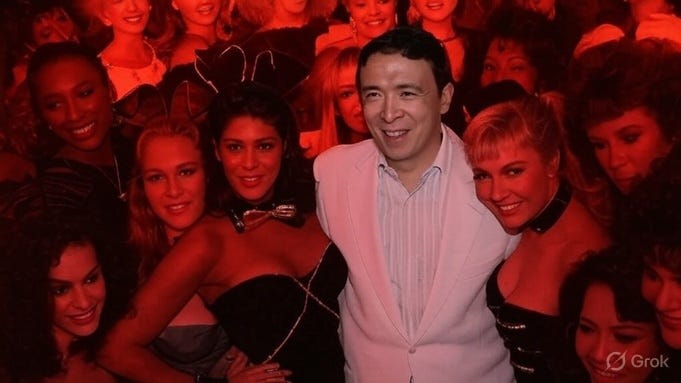Moonlight Reflected
post by Jacob Falkovich (Jacobian) · 2025-04-07T15:35:11.708Z · LW · GW · 0 commentsContents
Reverse Advice Yang’s Girls Confessions of a YINBY How to get e girl Commit to the Bit None No comments
Previously in sequence: Navigation by Moonlight [LW · GW]
Cross-posted from SecondPerson.dating.
I’m very proud of Navigation by Moonlight, and not just because it got a warm reception and resonated with many readers. I’m proud because I didn’t understand it well enough to write about even six months ago. Which, coincidentally, is when I submitted Second Person as a book proposal. Thankfully, my book agent gave up on me and a friend convinced me to start a Substack instead. I’m grateful to both!
Writing a Substack on some topic is the best way to actually learn and understand that topic. People hear what I do and rush to share their ideas about dating, their personal stories, their book recommendations. And, naturally, their critical feedback on my posts.
I won’t rehash my disagreements with feedback in mainline posts, but it’s worth following up on two points that came up repeatedly:
- That by encouraging yin I’m giving bad advice.
- That I’m ignoring all the women who date with yang and the men who yin.
#1 is completely wrong — I’m giving no advice at all. What I’m trying to encourage is understanding: of the approaches available to you, and of the approaches taken by the people you’re trying to date. And in this pursuit of understanding, I want to explore #2: what works and doesn’t work when women adopt a more proactive approach and men seek to yin?
After all, that’s what I’m doing myself.

Reverse Advice
The chapter on why I refrain from giving unambiguous instruction can be summarized in three words: dating is anti-inductive. There is no alpha in generic “dateability” advice, and nothing I could instruct without knowing you that would reliably help you. Even if the advice I gave was right for you, there’s some reason you’re not already doing it that won’t disappear because you read it in one more blog.
In fact, it’s even worse for general advice givers: the advice that filters to a reader without being personally tailored to them is more likely to be the opposite of what they need to hear:
When a young person is looking for job advice, I worry that all the artsy creative people whose heads are already way too high in the skies will be reading books by artsy creative people who urge them to follow their dreams, and so be even less mindful of the importance of a secure future. And all the hard-headed down-to-earth people will naturally gravitate toward reading Have A Very Secure Future By Going Into Business by Warren Buffett, and maybe never get reminded of the importance of following dreams. […]
I wonder whether everyone would be better off if they automatically reversed any tempting advice that they heard (except feedback directed at them personally). Whenever they read an inspirational figure saying “take more risks”, they interpret it as “I seem to be looking for advice telling me to take more risks; that fact itself means I am probably risk-seeking and need to be more careful”. Whenever they read someone telling them about the obesity crisis, they interpret it as “I seem to be in a very health-conscious community; maybe I should worry about my weight less.”
— Scott Alexander, Should You Reverse any Advice You Hear?
In the last post, I quoted Wesley Fenza’s explicit advice for women to “just ask people out.” I don’t think this is wrong advice for women in general, or that Wesley is wrong that there has been a lot of pressure historically on women to conform to a passive, feminine role. But I’m pretty sure this advice isn’t something that Wesley’s own female readers are much in need of.
Wesley is polyamorous, rationalist, liberal, and educated (as am I). His other readers undoubtedly skew towards these as well (as do mine). And all four of these already strongly nudge women towards a more yang approach to dating.
Liberalism and education are allied with feminism, the kind that celebrates women who step into historically male roles whether it be a CEO or alien-punching superhero. Conservatives do still try to stuff women into traditional gender boxes, but that only causes liberal and educated people to toss these boxes out without examination. Eneasz Brodski describes how growing up in a liberal city he didn’t believe that men were physically stronger than women — there wasn’t enough non-fictional evidence to contradict popular fiction and the popular desire to not be like those sexist rubes.

To be clear, I reject the trad caricature of gender roles as well. I never argue that women must be coy and receptive because God ordained it or because civilization depends on it. I try to explain yin on its own terms, not as an imposition from the outside.
I touched on how yang-oriented rationalism is, to the point where rationalists often take it to be a core virtue in itself and yin a vice. Even aside from the general message, rationalist women are nudged towards taking the reins simply by how rationalist men are.
Nerdy, tism-adjacent men are famous for being bad at picking up subtle cues and for overall timidity around women. The two go hand-in-hand: if a guy doesn’t trust his ability to read what a woman wants he will hesitate to make a move. This hesitation is compounded by facing social risk in the one social group where he feels comfortable, a group where women are rare and more valued than men. With the yang role vacated by men, rationalist women step into it whether with enthusiasm or reluctace.
And as for polyamory — we’ll get to that in a bit.
Perhaps some women really need to hear that asking men out is an option, but then again some already feel uncomfortably pressured to do so. My own female readers felt seen and validated by my essay, but not because I was advising them to be more yin than they already are or less so. And my advice to men was: try to understand where women are coming from instead of judging them, especially if you plan to date any.
And with that, let’s try to understand where yang women and yin men are coming from. And, more importantly, where they’re going.
Yang’s Girls

The core driver of the classic gendered pattern are each gender’s basic desires. For women: to feel special and uniquely devoted to. For men: to feel capable and admired for their actions. Different men and women feel these to a different extent, but the difference doesn’t come from the blog posts they read. These come from a much deeper place than mere cultural programming.
The starting point for going against the classic pattern is understanding what you’re giving up. For yang women: giving up the some power to select men for special devotion, and for yin men: to prove themselves. The question is whether this sacrifice is worth it, and what is gained instead.
A reader who is “doing all the yang-things” asked me if it makes her less attractive to men she’s fond of. This is a common argument against girls “chasing men”. Is it true?
Perhaps, if her forwardness gets tangled with negative signals of desperation or makes a man insecure. I suspect it’s not true of this lady in particular, since she dates in the sorts of demographics that nudge women to take charge. The real answer is: there’s no way to know. Whatever impact “yang-things” have on her attractiveness is swamped by the selection effects on the men she ends up on a date with.
Women pay attention to the guys hitting on them. They’re somewhat aware of the guys not hitting on them, though these are less salient. And they give even less notice to all the girls these guys are not hitting on.
Last week I asked men to appreciate that women who don’t ask guys out aren’t cowards, but women must also appreciate that asking a woman out is difficult and risky for a man. Even the most promiscuous man passes a thousand women by on the street for every one he actually starts a conversation with. A guy asking you out is a strong signal, in both the social and information theory sense, of his particular interest in you.
In contrast, a guy saying “yes” to being asked out says little beyond the fact that he’d at least enjoy having low-obligation sex with you. And, well, you probably knew that this was true before asking him.
Corollary: if a woman wants to have low-obligation sex with men she can yang-max to her heart’s content. The obvious case here is polyamorous women who have a primary partner; check out the SlutStack for more dispatches from that particular lifestyle. Same for any girl embarking on a slutty phase at any age: own it, and go yang it.
Yang also works for unusual women with strong personalities. I have two female friends who are as brilliant as they are crazy, who have both great appeal and glaring weaknesses as partners. It doesn’t matter if they asked a guy out first or vice versa: the men will sort themselves out soon enough by falling madly in love or running away in terror.
But generally, a woman who is looking for devotion and commitment must overcome the loss of selection power that comes with making the initial approach herself. This means careful evaluation of the relationship as it goes. Is the man doing the minimum he’s asked to, or is he responsive to your needs, proud to be seen with you, and escalating commitment of his own accord? It also means carefully selecting the circles in which you ask men out: are they full of shy but high-quality men? More importantly, would these circles socially punish a man for taking advantage of a woman?
The risk that female yang runs is wasting time with indifferent men. If a woman takes the male role of initiating contact and lets him do the initial gatekeeping, she must also commit to playing the reversed roles a few months later: let the man escalate from casual fling to committed relationship, and break it up if he doesn’t.
This is the hard and unpleasant part. Women don’t like to give up on reluctant men, and a yang-oriented woman will be even more driven to try and change him or win him over. But without the reassurance of being selected by him to start with, this may be a lost cause. If women want to be the ones making the initial choice, they need to be able to admit when they chose wrong.
Confessions of a YINBY

I quit dating apps in 2020, after:
- COVID left only the most desperate users on them.
- I met Twitter friends in person, which opened up my social flirting space.
- 10 Hinge matches in a row got upset to the point of typing obscenities in all caps to find out that I’m non-monogamous and married, even though that was disclosed in the first line of my profile.
I was somewhat surprised that Hinge only allows illiterate women on the app, but I wasn’t surprised that ENM men get hate and opprobrium for daring to flirt outside carefully ring-fenced “polyamory spaces”. Unfortunately, “polyamory spaces” are full of people who make “poly” their entire personality and political identity; I can hardly stand them, let alone date them.
So: I’m in a situation where it’s too high-risk-low-reward to ask out women unless I know them well and have a strong signal of their interest in meeting not just any guy, but me in particular. In other words: I’m in the female situation, and I must adopt female tactics.
My inspiration can be no other than the world’s premier understander of females, Delicious Tacos:
How to get e girl
Delicious Tacos: Be hot. But no hot person asks how to get women. So be famous.
The punch line of this column is who the fuck are we to give advice. But I've done it. Get famous. Get online famous, the world's tallest dwarf. And e girls will message you […] People shit on e girls but every one I've met is brilliant. Stark contrast to Los Angeles Bumble women, who should be launched into the sun.
I’m writing in public to be the world’s tallest dwarf showcase my wit, wisdom, and virtue. Once or twice a year, an e-girl does message me, at which point I try arrange for us to spend time socializing so that I can learn who they are and what they really want from a potential relationship with me. I do this because I am more interested in deep, ongoing relationships — another “female” trait — and because I want to feel that the girl I’m with is special to me.
Also, I’m at best the world’s 49th tallest dwarf.

Yin-dating requires a lot of skill, one that is rarely taught and difficult to learn. A male yin master maintains a magnetic sense of mystery, radiates comfort and calm through physical presence alone, is emotionally attuned, and is adept at creating space for others to express themselves. I’m skilled at maybe 1.5 / 4 of those on a good day, 0.5 on a bad one (people do feel calm and grounded in my presence, including toddlers and very dramatic women).
But one mistake I never make is confusing yin for being scared, passive-aggressive, or a doormat. Yin is power. Yang is power. Whichever approach you take, it only works when you own that power.
Commit to the Bit
As I wrote last week, a lot of yin failures come from a failure sufficiently commit to it. And yet when a woman fails she faces a lot of pressure to swing the opposite way, not to recommit. The same is even more true of going against gendered type.
A yang woman must commit not just to asking men out, but to taking rejection on the chin and also to being the one to decisively end it if the relationship stalls. She has to confidently direct without being controlling, ask for what she wants explicitly, and not resent the man for not taking over the driver’s seat. The failures of yang come from lack of confidence, which men are explicitly taught but girls aren’t.
The same is true of a yin man who creates ambiguity through mixed signals, uses “listening” to cover up his own inability to open up, tries to nudge his partner with passive aggression, and resents her for crossing boundaries he never explicitly set. Yin requires believing in magic.
When couples have been together for a while, the two roles usually converge. The man slowly learns to create space and to pick up on cues, the woman learns to be more explicit and proactive when she needs to. Marriages do work best when the spouses adopt complementary roles rather than the same one, but these roles are complex and not necessarily polarized in the traditional yin/yang female/male way.
But in the early flirting stages of a relationship, the two people don’t know each other well enough to pull it off. The classic yin/yang pattern is a necessity under high uncertainty: it gives people established roles to slide into, and a way to gather information about each others’ character, level of interest, approach to intimacy, and long-term compatibility.
A big danger of playing against type is the temptation to give up the polarity too early, to revert to the seemingly safe egalitarianism of occupying a similar role. Once this happens it becomes very hard to re-polarize, like trying to separate a beige paint mix back into vibrant colors.
To bring both posts to a full lunar circle: the failures of both yin or yang come from lack of conviction in one’s approach and lack of respect for the other.
If a woman gave up yin because it’s weak and cowardly, how will she respect the yin men that she attracts? If a guy rejected yang because he finds it creepy and domineering, he will feel insecure and controlled by the girl who yanged him.
J. S. Mill said: “He who knows only his own side of the case knows little of that.” This is especially true of dating. Skillful yin and skillful yang require deep understanding of both, the ability to receive your partner’s energy in addition to projecting your own. And once you understand both, you will know exactly the role that fits you and how to play it. You will no longer need any advice from dating blogs.
Next: Coupling for Decouplers
0 comments
Comments sorted by top scores.